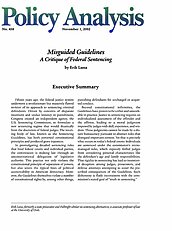In promulgating detailed sentencing rules that bind federal courts and individual parties, the commission is making law through an unconstitutional delegation of legislative authority. This practice not only violates the constitutional principle of separation of powers, but also severs the typical lines of political accountability in American democracy. Moreover, the Guidelines themselves violate a number of constitutional rights by, among other things, punishing defendants for uncharged or acquitted conduct.
Beyond constitutional infirmities, the Guidelines have proven to be unfair and unworkable in practice. Justice in sentencing requires an individualized assessment of the offender and the offense, leading to a moral judgment imposed by judges with skill, experience, and wisdom. Those judgments cannot be made by a distant bureaucracy pursuant to abstract rules that disregard important context. Yet that is precisely what occurs in today’s federal courts: Individuals are sentenced under the commission’s micromanaged rules, which expressly forbid judges from considering personal characteristics like the defendant’s age and family responsibilities. That rigidity in sentencing has led to intentional deception among judges, prosecutors, and defense attorneys attempting to avoid the prescribed consequences of the Guidelines. Such dishonesty is flatly inconsistent with the commission’s stated goal of “truth in sentencing.”


